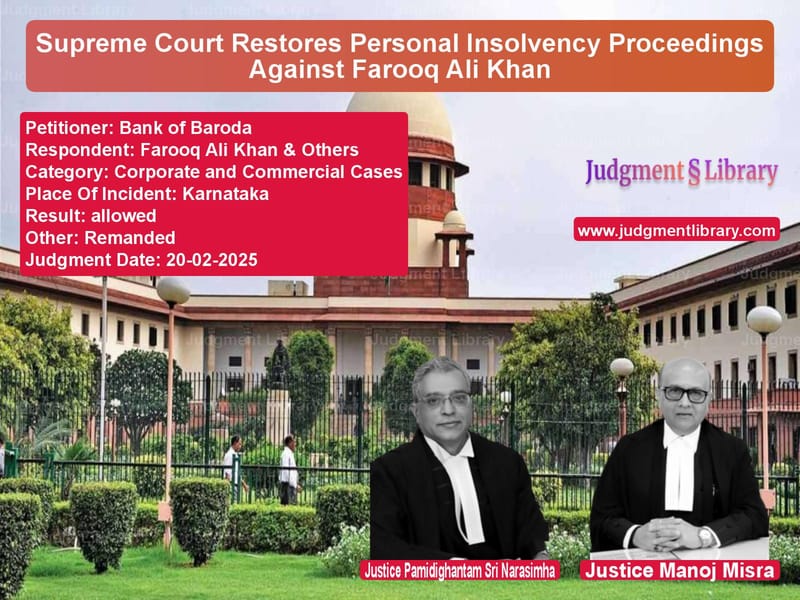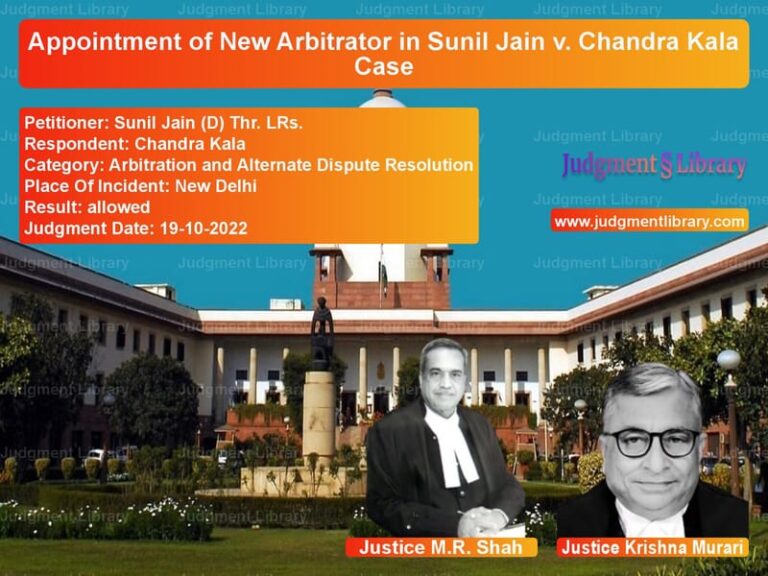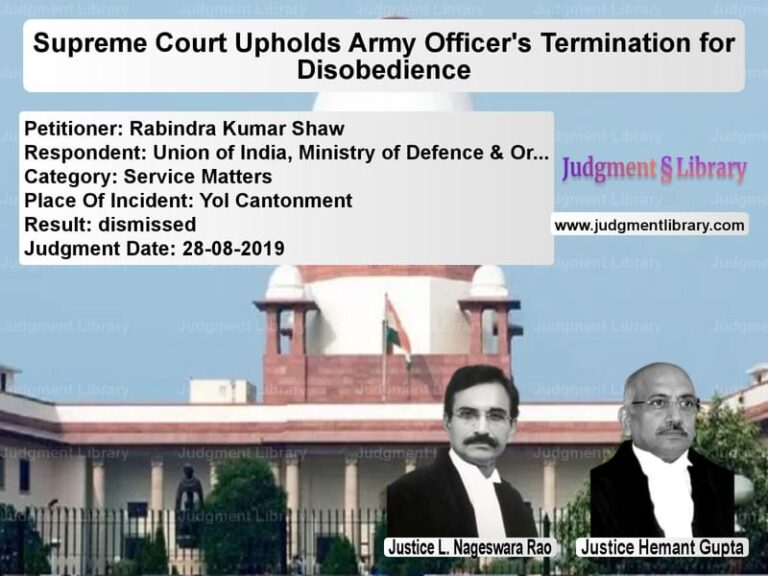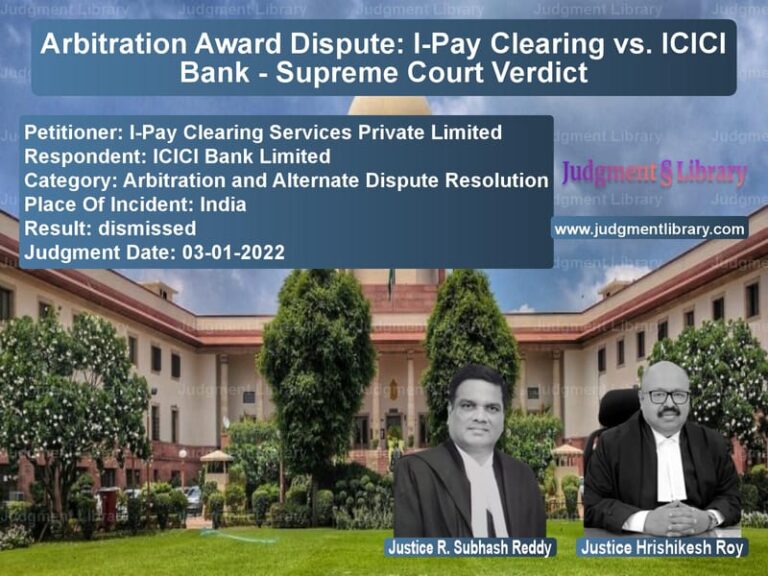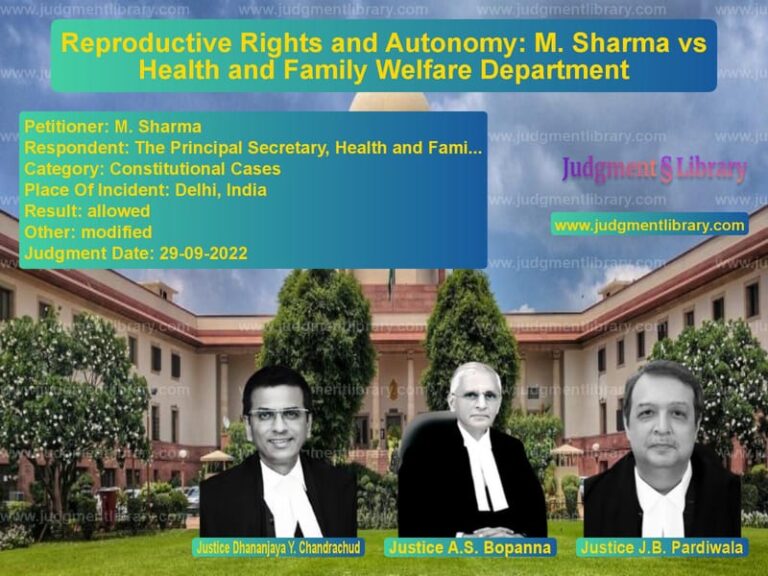Supreme Court Restores Personal Insolvency Proceedings Against Farooq Ali Khan
The Supreme Court of India, in its judgment on February 20, 2025, ruled in favor of the Bank of Baroda, allowing the continuation of personal insolvency proceedings against Farooq Ali Khan. The Court set aside the Karnataka High Court’s order, which had quashed the insolvency proceedings under Article 226 of the Constitution. This landmark judgment reaffirms the statutory process of the Insolvency and Bankruptcy Code (IBC), 2016, and limits judicial intervention in insolvency matters.
Background of the Case
Farooq Ali Khan, the respondent, was a promoter and director of Associate Décor Limited, a corporate debtor undergoing a Corporate Insolvency Resolution Process (CIRP). While the CIRP proceedings were ongoing, the Bank of Baroda initiated personal insolvency proceedings against Khan under Section 95 of the IBC. The insolvency application stemmed from his role as a personal guarantor for corporate loans taken by Associate Décor Limited.
The bank had issued a demand notice on August 11, 2020, calling upon Khan and other guarantors to settle outstanding dues amounting to Rs. 244 crores. In response, Khan offered Rs. 25 crores as full and final settlement, which was rejected by the bank. Subsequently, the bank filed an application under Section 95(1) of the IBC, seeking to initiate insolvency proceedings against Khan.
The National Company Law Tribunal (NCLT), acting as the Adjudicating Authority, appointed a resolution professional on February 16, 2024, to examine the insolvency application and submit a report under Section 99 of the IBC.
High Court’s Decision
Farooq Ali Khan challenged the NCLT’s order in the Karnataka High Court under Article 226 of the Constitution, arguing that his liability as a guarantor had been waived and that the insolvency proceedings against him were not maintainable.
The High Court ruled in Khan’s favor, holding that:
- His liability as a personal guarantor stood discharged.
- Personal insolvency proceedings against him were not maintainable.
- The resolution professional’s appointment by NCLT should be quashed.
Following the High Court’s ruling, the NCLT disposed of the insolvency proceedings against Khan on June 19, 2024.
Petitioner’s Arguments (Bank of Baroda)
The Bank of Baroda, represented by Solicitor General Tushar Mehta, challenged the High Court’s order before the Supreme Court. The bank argued that:
- The High Court wrongly interfered in an ongoing insolvency proceeding by prematurely determining the existence of debt.
- The IBC lays down a statutory mechanism for adjudicating personal insolvency applications, which the High Court bypassed.
- The resolution professional was yet to complete his report under Section 99, and judicial review should only be exercised after the statutory process is completed.
- The Supreme Court’s ruling in Dilip B. Jiwrajka v. Union of India (2024) had already established that objections regarding limitation and existence of debt should be considered only after the resolution professional submits his findings.
Respondent’s Arguments (Farooq Ali Khan)
Farooq Ali Khan, represented by senior counsel Shyam Mehta, defended the High Court’s ruling, contending:
- His liability as a guarantor had been waived due to a settlement agreement with the bank.
- The High Court had the authority to exercise judicial review under Article 226 to prevent unnecessary harassment through insolvency proceedings.
- The bank’s claims were time-barred under the Limitation Act.
- Since the corporate debtor’s CIRP was already ongoing, pursuing personal insolvency proceedings against him was redundant.
Supreme Court’s Observations
The Supreme Court examined the IBC framework and cited its previous ruling in Jiwrajka, which clarified that the resolution professional must first assess the validity of the debt before the NCLT takes a final decision under Section 100.
The Court observed:
“The High Court precluded the statutory mechanism from taking its course and made a premature determination on the existence of debt, which is a mixed question of law and fact meant for the Adjudicating Authority.”
The Court further clarified that:
- The NCLT had correctly appointed a resolution professional as per Section 97 of the IBC.
- The resolution professional’s role is merely to gather information and provide recommendations, and the NCLT has the final authority to adjudicate on insolvency applications.
- Judicial intervention at such an early stage disrupts the statutory process laid out under the IBC.
- The High Court exceeded its jurisdiction by substituting itself as the decision-making authority in an insolvency matter.
Final Judgment
The Supreme Court set aside the High Court’s decision and restored the personal insolvency proceedings against Farooq Ali Khan. The Court ruled:
“The Adjudicating Authority’s order dated 16.02.2024 is reinstated. The insolvency proceedings shall resume from the stage of the resolution professional’s report under Section 99 of the IBC.”
The Court directed the NCLT to expedite the matter, given that it had been pending since 2021.
Impact of the Judgment
This judgment has significant implications for insolvency law in India:
- Limits Judicial Intervention: The ruling reinforces that High Courts should not interfere in insolvency proceedings at a preliminary stage.
- Strengthens the IBC Framework: The decision upholds the statutory mechanism under the IBC and prevents circumvention of its processes.
- Clarifies Role of Resolution Professionals: It confirms that objections regarding the existence of debt must be examined first by the resolution professional before the NCLT makes a determination.
- Prevents Misuse of Article 226: The judgment sets a precedent against using writ petitions to stall insolvency proceedings.
Conclusion
The Supreme Court’s ruling in Bank of Baroda vs. Farooq Ali Khan reaffirms the principle that insolvency proceedings must follow the due process outlined in the IBC. By setting aside the High Court’s interference, the judgment ensures that financial creditors can seek recourse against personal guarantors without undue judicial obstruction. The case underscores the importance of adhering to statutory procedures and maintaining the integrity of the insolvency resolution process.
Petitioner Name: Bank of Baroda.Respondent Name: Farooq Ali Khan & Others.Judgment By: Justice Pamidighantam Sri Narasimha, Justice Manoj Misra.Place Of Incident: Karnataka.Judgment Date: 20-02-2025.
Don’t miss out on the full details! Download the complete judgment in PDF format below and gain valuable insights instantly!
Download Judgment: bank-of-baroda-vs-farooq-ali-khan-&-ot-supreme-court-of-india-judgment-dated-20-02-2025.pdf
Directly Download Judgment: Directly download this Judgment
See all petitions in Bankruptcy and Insolvency
See all petitions in Company Law
See all petitions in Corporate Compliance
See all petitions in Judgment by P.S. Narasimha
See all petitions in Judgment by Manoj Misra
See all petitions in allowed
See all petitions in Remanded
See all petitions in supreme court of India judgments February 2025
See all petitions in 2025 judgments
See all posts in Corporate and Commercial Cases Category
See all allowed petitions in Corporate and Commercial Cases Category
See all Dismissed petitions in Corporate and Commercial Cases Category
See all partially allowed petitions in Corporate and Commercial Cases Category

